|
|
|
Sort Order |
|
|
|
Items / Page
|
|
|
|
|
|
|
| Srl | Item |
| 1 |
ID:
003912
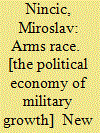

|
|
|
|
|
| Publication |
New York, Praeger, 1982.
|
| Description |
x, 209p.
|
| Standard Number |
0030603323
|
|
|
|
|
|
|
|
|
|
|
|
Copies: C:1/I:0,R:0,Q:0
Circulation
| Accession# | Call# | Current Location | Status | Policy | Location |
| 022365 | 355.82/NIN 022365 | Main | On Shelf | General | |
|
|
|
|
| 2 |
ID:
149500
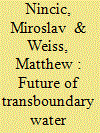

|
|
|
|
|
| Summary/Abstract |
MIROSLAV NINCIC and MATTHEW WEISS argue that conflict over access to fresh water could threaten the future of international security. They examine conditions under which such conflict may arise in the Middle East and South Asia. The authors identify countries most at risk for water-related conflict and propose policy recommendations to mitigate for these risks.
|
|
|
|
|
|
|
|
|
|
|
|
|
|
|
|
| 3 |
ID:
097758


|
|
|
|
|
| Publication |
2010.
|
| Summary/Abstract |
Positive inducements as a strategy for dealing with regimes that challenge core norms of international behavior and the national interests of the United States ("renegade regimes") contain both promises and pitfalls. Such inducements, which include policy concessions and economic favors, can serve two main purposes: (1) arranging a beneficial quid pro quo with the other side, and (2) catalyzing, via positive engagement, a restructuring of interests and preferences within the other side's politico-economic system (such that quid pro quos become less and less necessary). The conditions for progress toward either purpose can vary, as can the requirements for sufficient and credible concessions on both sides and the obstacles in the way of such concessions. For renegade regimes, a primary consideration involves the domestic purposes that internationally objectionable behavior can serve. An examination of the cases of North Korea, Iran, and Libya finds that negative pressures have been relatively ineffective, suggesting that more attention should be given to the potential for positive inducements to produce better outcomes.
|
|
|
|
|
|
|
|
|
|
|
|
|
|
|
|
| 4 |
ID:
037693
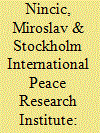

|
|
|
|
|
| Publication |
London, Taylor & Francis, 1985.
|
| Description |
viii, 109p.
|
| Standard Number |
0850663024
|
|
|
|
|
|
|
|
|
|
|
|
Copies: C:1/I:0,R:0,Q:0
Circulation
| Accession# | Call# | Current Location | Status | Policy | Location |
| 025314 | 355.02/NIN 025314 | Main | On Shelf | General | |
|
|
|
|
| 5 |
ID:
075007
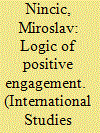

|
|
|
|
|
| Publication |
2006.
|
| Summary/Abstract |
This article is intended to offset, partially at least, the lopsided stress placed by international relations scholarship on punitive pressures, at the expense of positive inducements, as tools for bringing renegade regimes into compliance with internationally accepted norms of behavior. I discuss the focus on punishment as a tool of foreign policy and the reasons why this bias has provided disappointing results. Using a parallel theoretical framework, I then discuss the forms that inducements can assume and the circumstances encouraging their success. The hypotheses thus derived are applied to a number of specific policy challenges. The bottom line is that inducements can, at times, produce a direct quid pro quo from the target regime and, occasionally, can modify that regime's basic motivations, so that both punishments and rewards become less necessary. In any case, positive engagement is most effective when regime's position is being challenged from within.
|
|
|
|
|
|
|
|
|
|
|
|
|
|
|
|
| 6 |
ID:
078138


|
|
|
| 7 |
ID:
117849
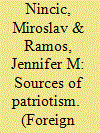

|
|
|
|
|
| Publication |
2012.
|
| Summary/Abstract |
Patriotism, as attachment to country, is the value on which most foreign policy attitudes ultimately hinge, yet very little in the academic literature addresses the implications of the way in which the foundations for this attachment are conceived. Two variants of patriotism can be identified: one absolute, the other contingent. For those holding the latter conception, patriotism must be justified by one's country's actions: the greater the approval of one's country's policies, the greater the degree of patriotic attachment that is warranted. For those holding the former conception, patriotism is an absolute and a constant value, and it is reflected in support for one's country when the going gets tough. We seek to understand the circumstances that determine how critical or uncritical a patriot a person would be, given both specific conditions related to the individual and the international situation more generally. Moreover, we are interested in accounting for overall levels of patriotism. We use survey data from the PEW, as well as experimental data, to examine these matters. We find that factors internal to the individual, and not external conditions, determine the kind of patriot one is; at the same time, overall patriotism is found to be influenced by both internal and external circumstances.
|
|
|
|
|
|
|
|
|
|
|
|
|
|
|
|
| 8 |
ID:
106353


|
|
|
|
|
| Publication |
2011.
|
| Summary/Abstract |
This study considers the clash between views on what is ethically permissible and the claimed imperatives of the war on terror. It does so by examining the forms of reasoning that members of the US public apply when judging the acceptability of torture as a tool of that war. Moral judgments are formed around two models of ethical reasoning. The first, usually referred to as the deontological perspective, deems that the ethical merit of an act is intrinsic to its character. The second, consequentialist, view, evaluates ethical merit by the consequences an act produces (for example, lying might be good). Because, however, policies often are judged in light of both perspectives, ethical impulses do not always point in the same direction. Our study uses both survey analysis and experimental methods to elicit the relative weight of deontological and consequentialist arguments that have been marshaled for and against torture. We find that across various levels of torture, the former dominate in the public mind. We also find that, counterintuitively, attitudes toward the abusive treatment of terrorist suspects are not significantly related to the intensity of the perceived foreign threat.
|
|
|
|
|
|
|
|
|
|
|
|
|
|
|
|
| 9 |
ID:
004613
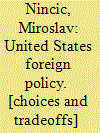

|
|
|
|
|
| Publication |
Washington DC, Congressional Quarterly, 1988.
|
| Description |
xiv, 407p.
|
| Standard Number |
0871874490
|
|
|
|
|
|
|
|
|
|
|
|
Copies: C:1/I:0,R:0,Q:0
Circulation
| Accession# | Call# | Current Location | Status | Policy | Location |
| 035508 | 327.73/NIN 035508 | Main | On Shelf | General | |
|
|
|
|
|
|
|
|
|